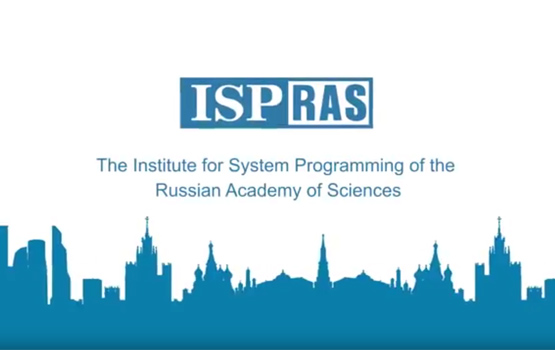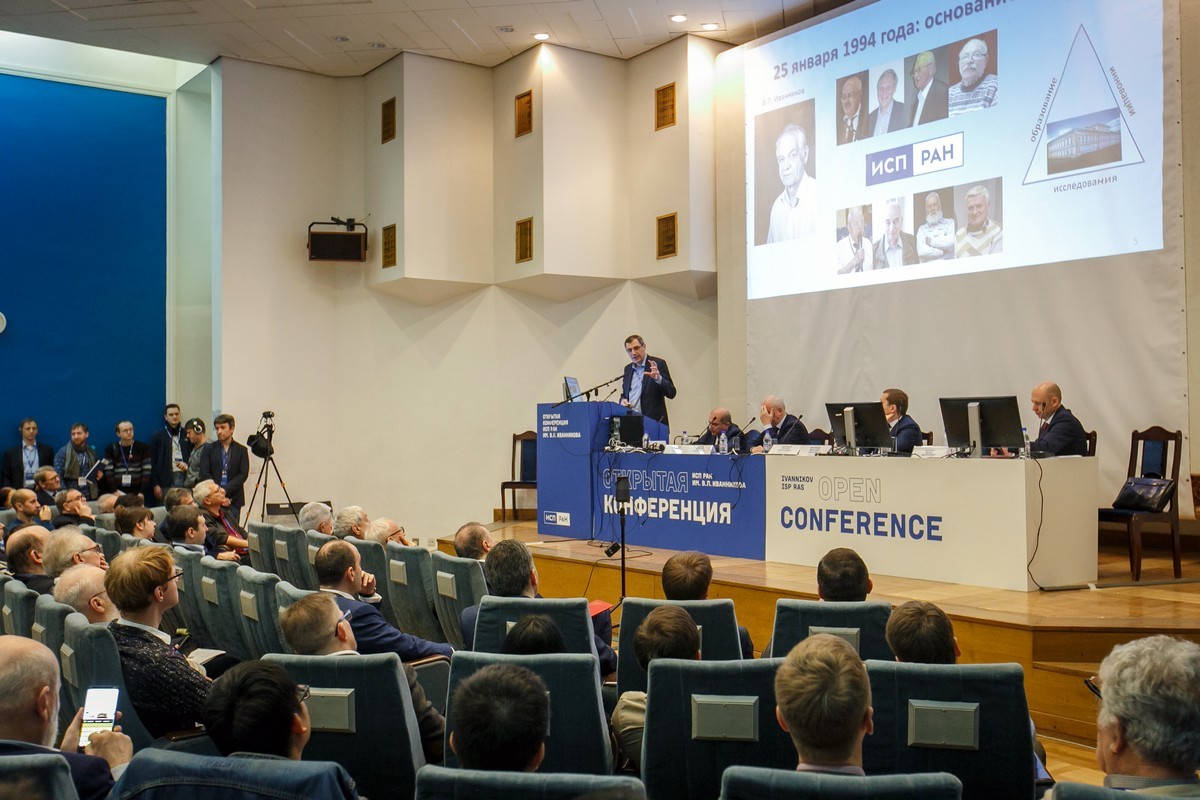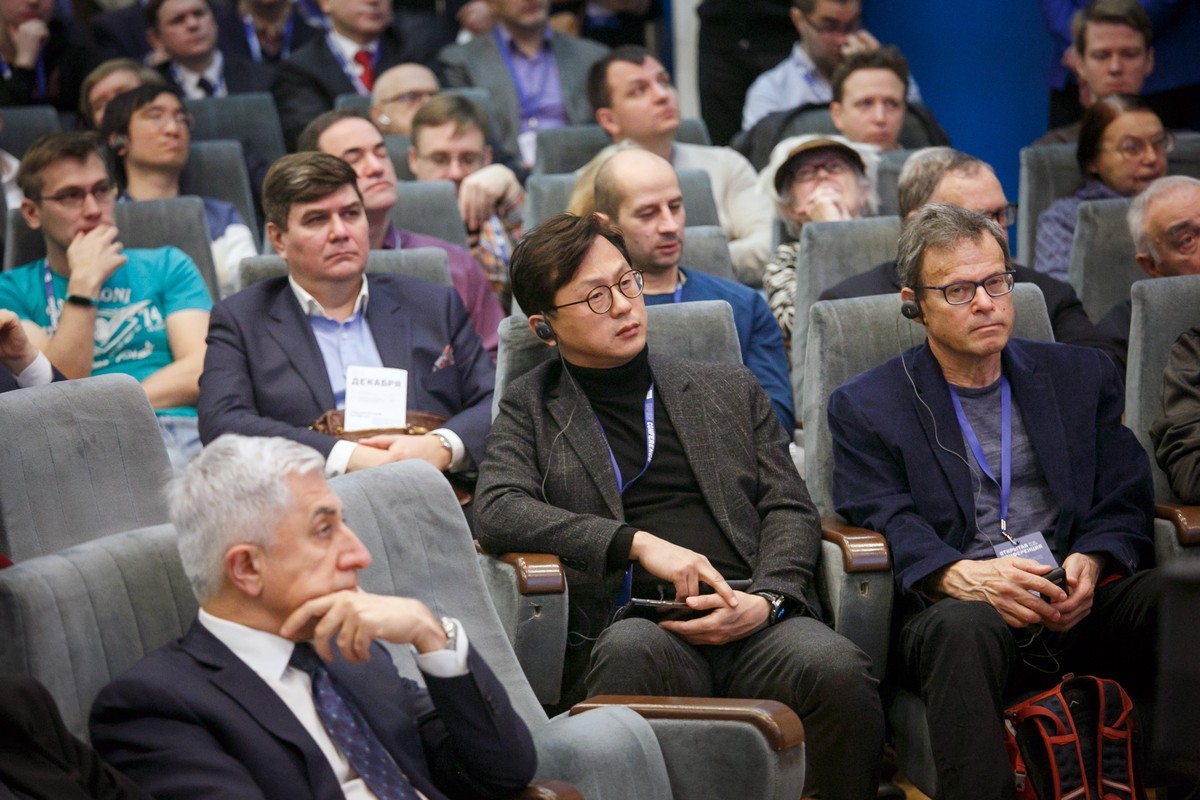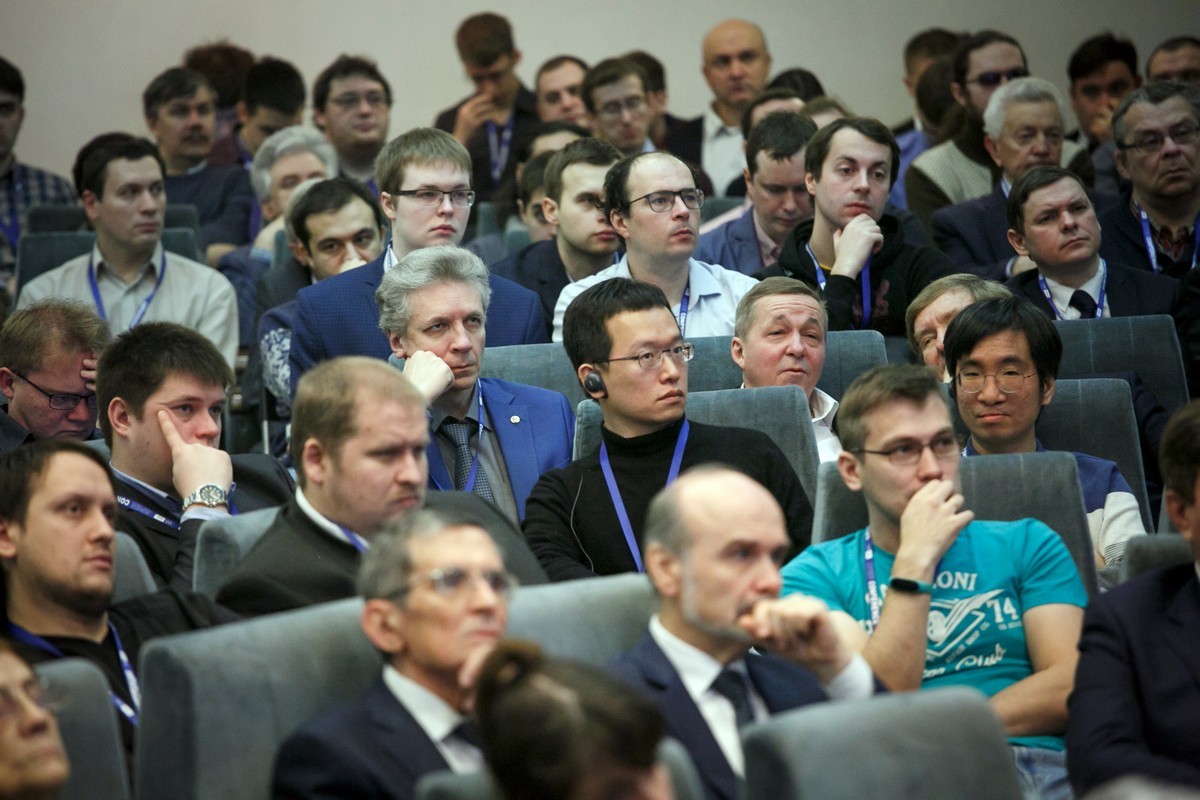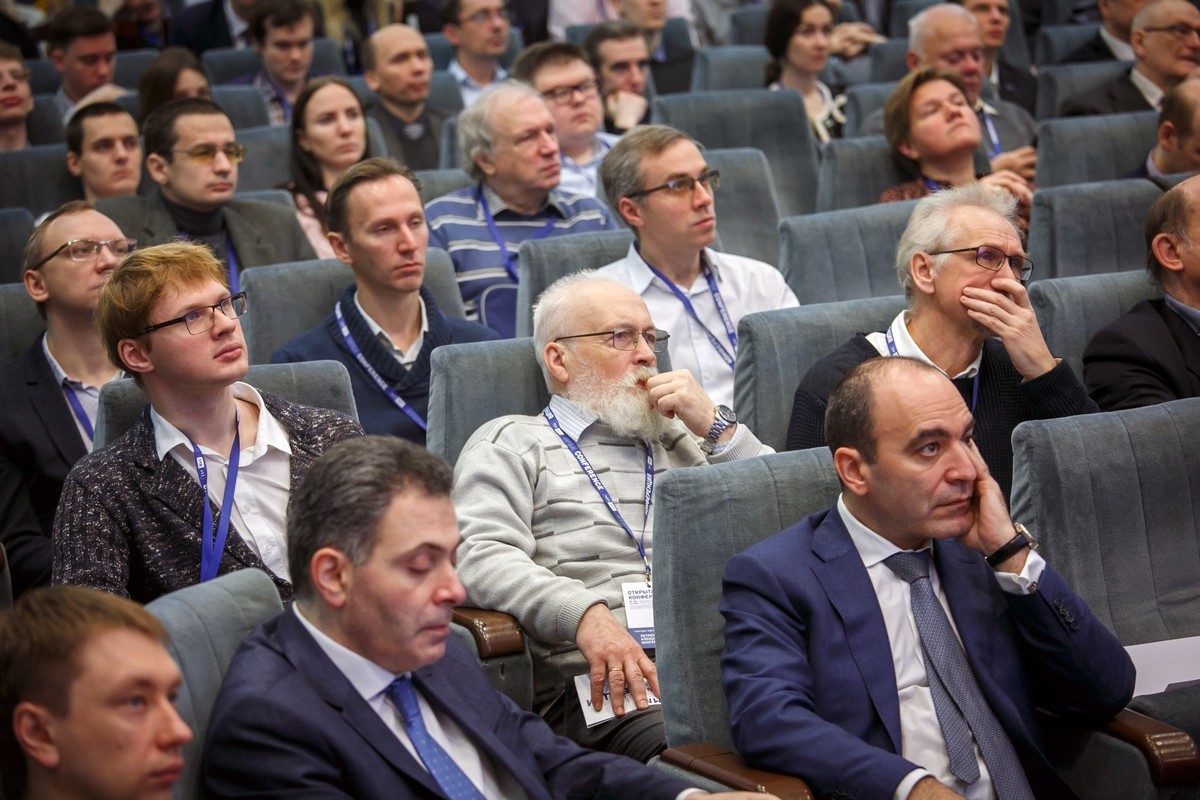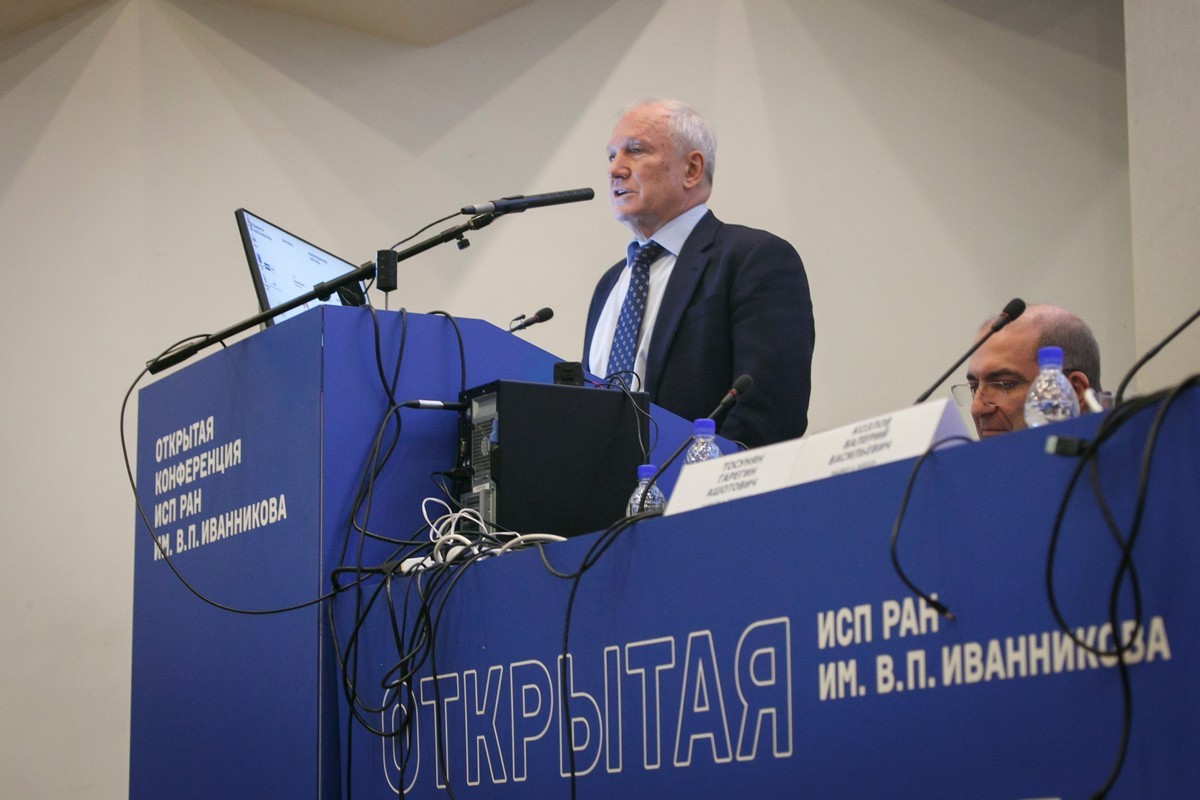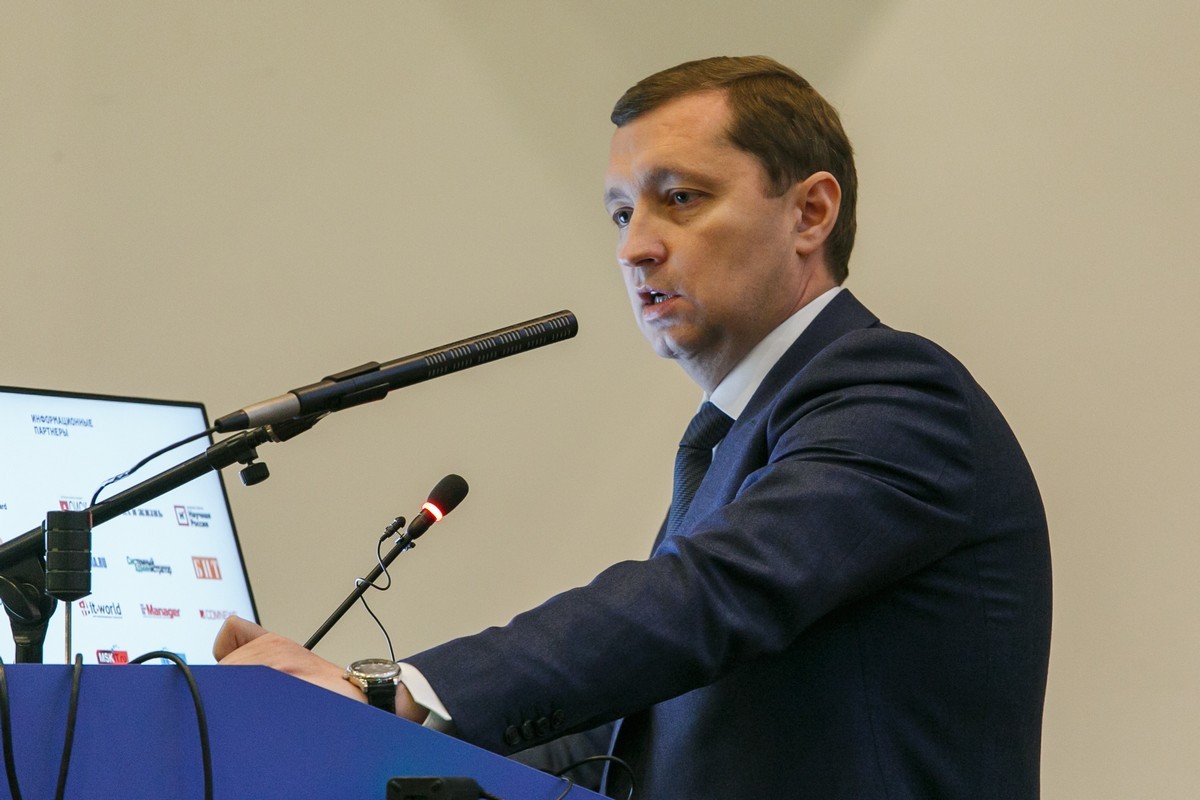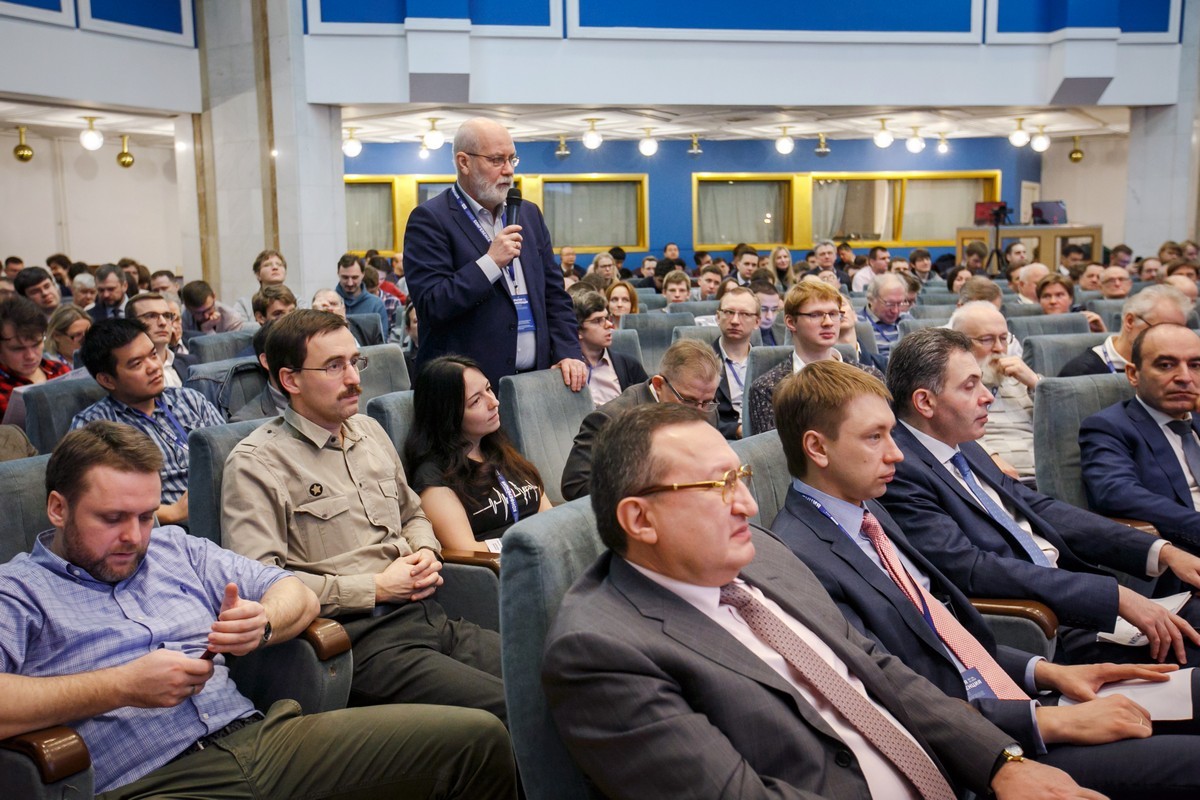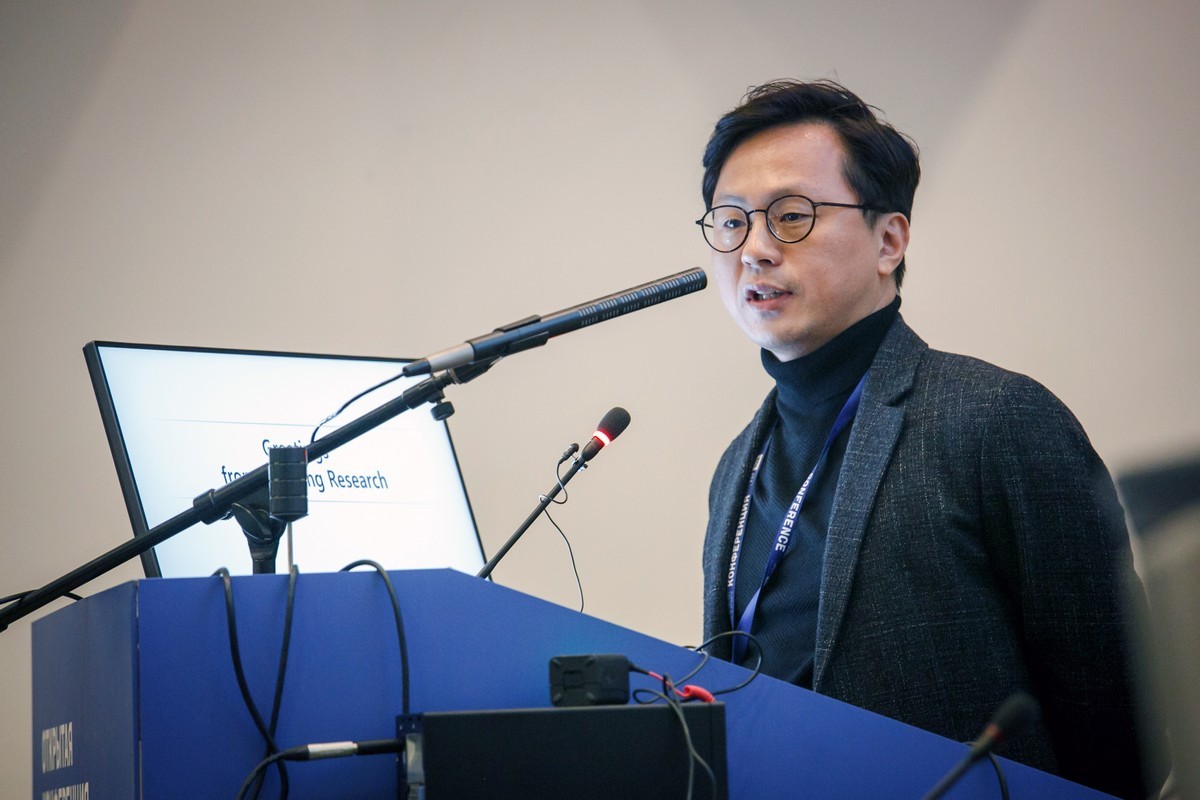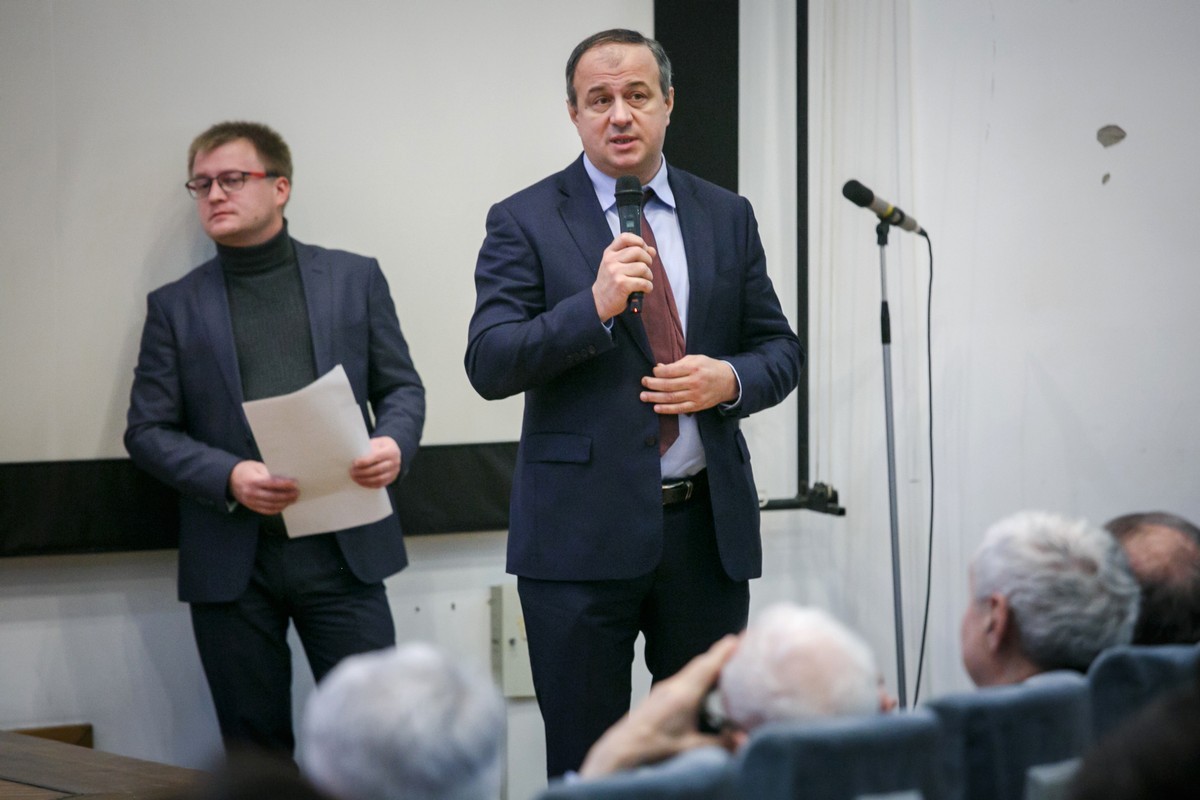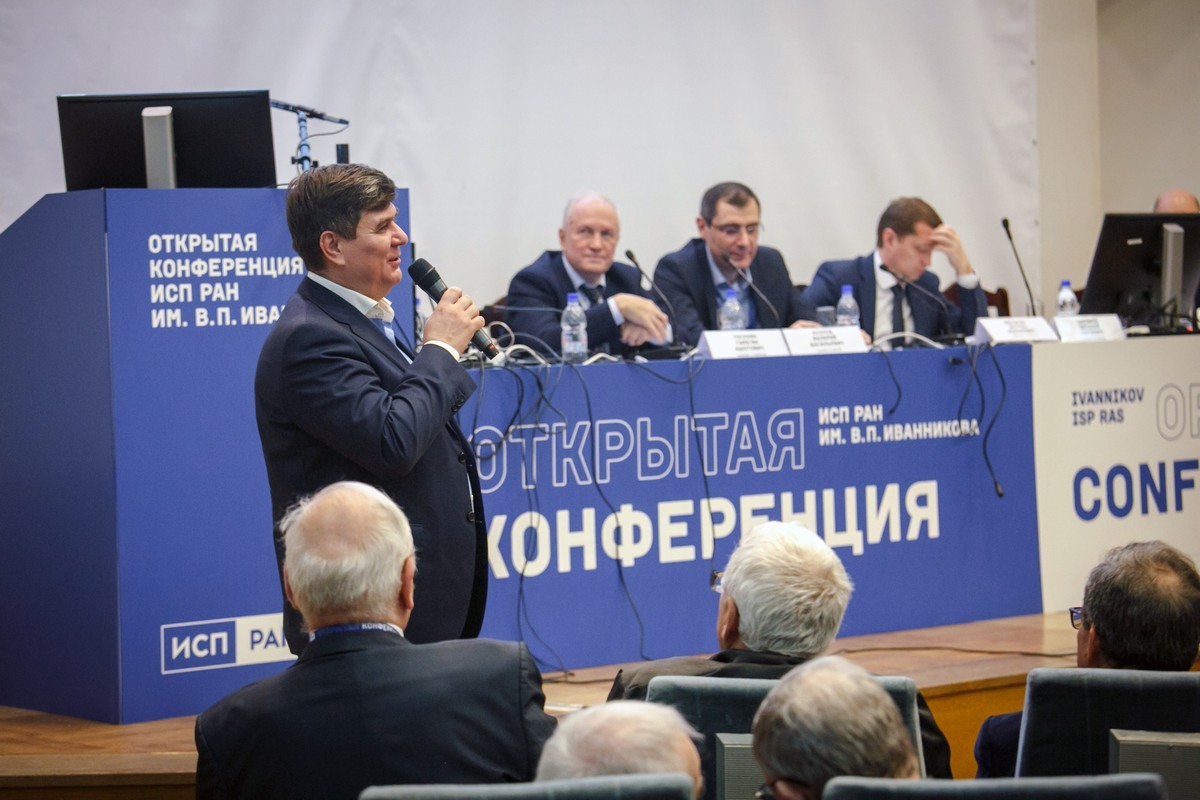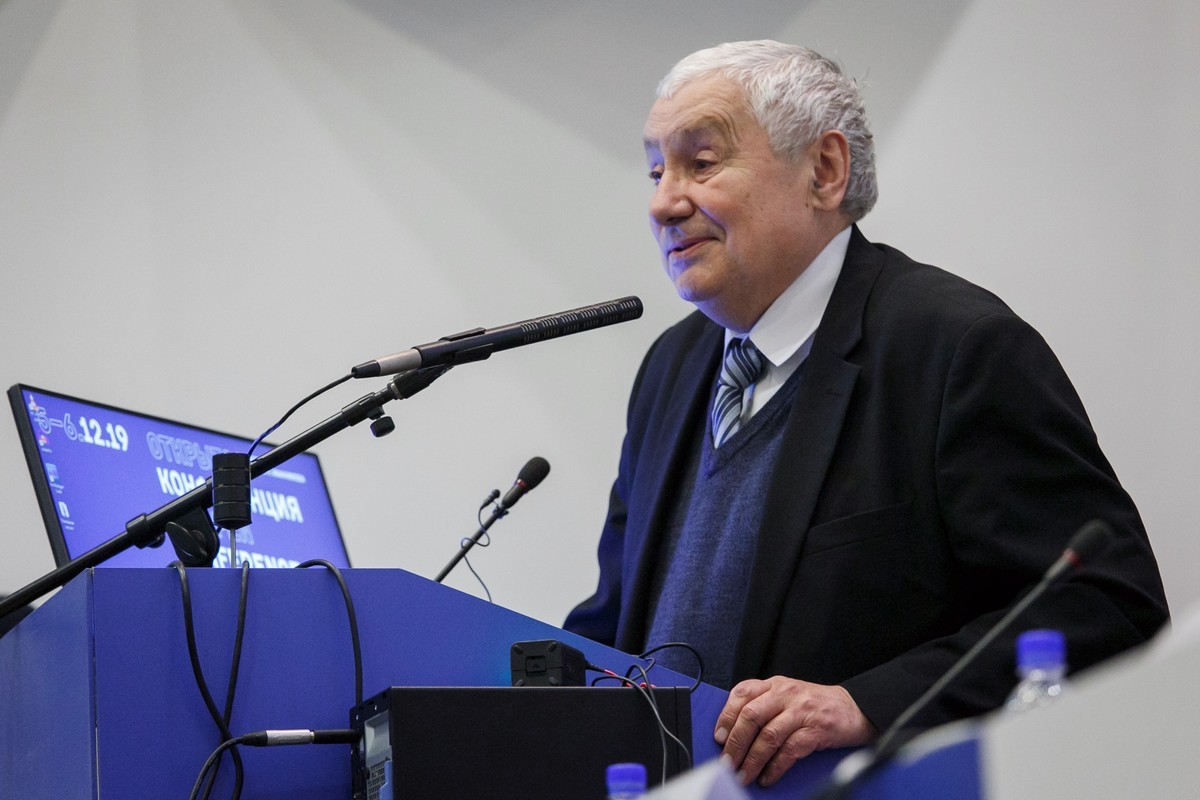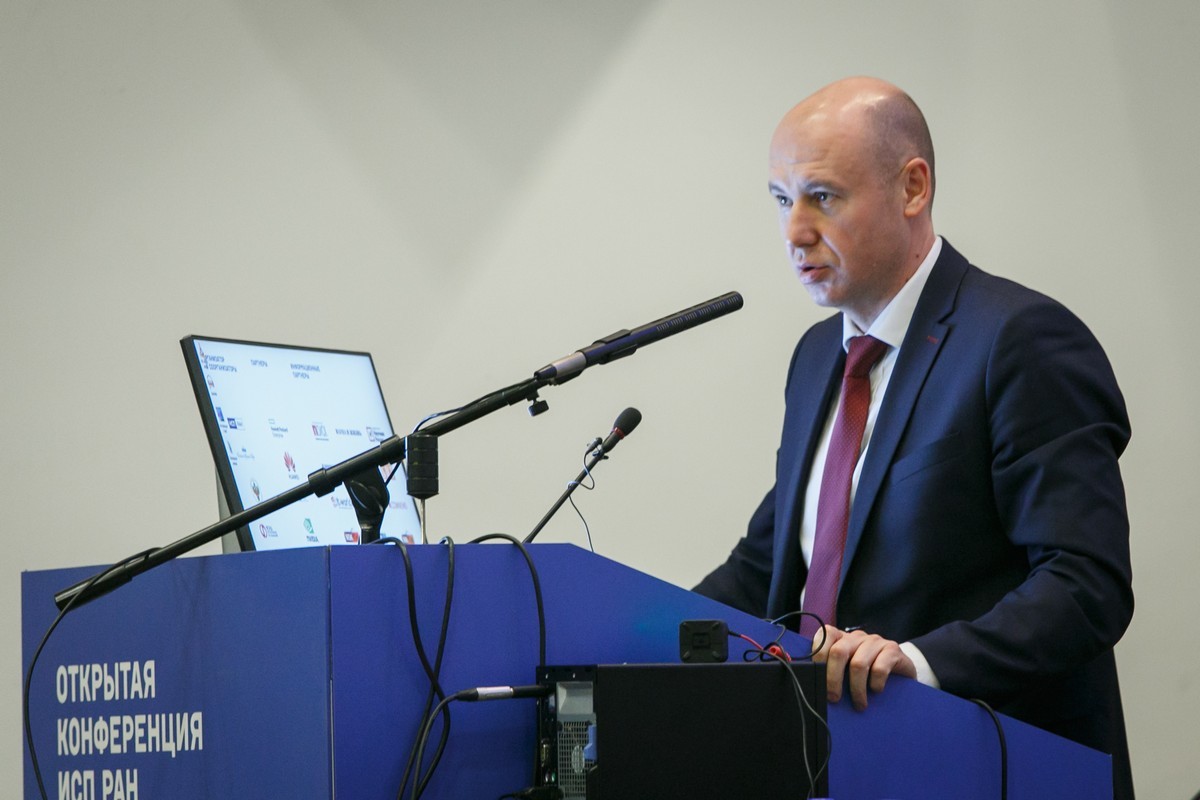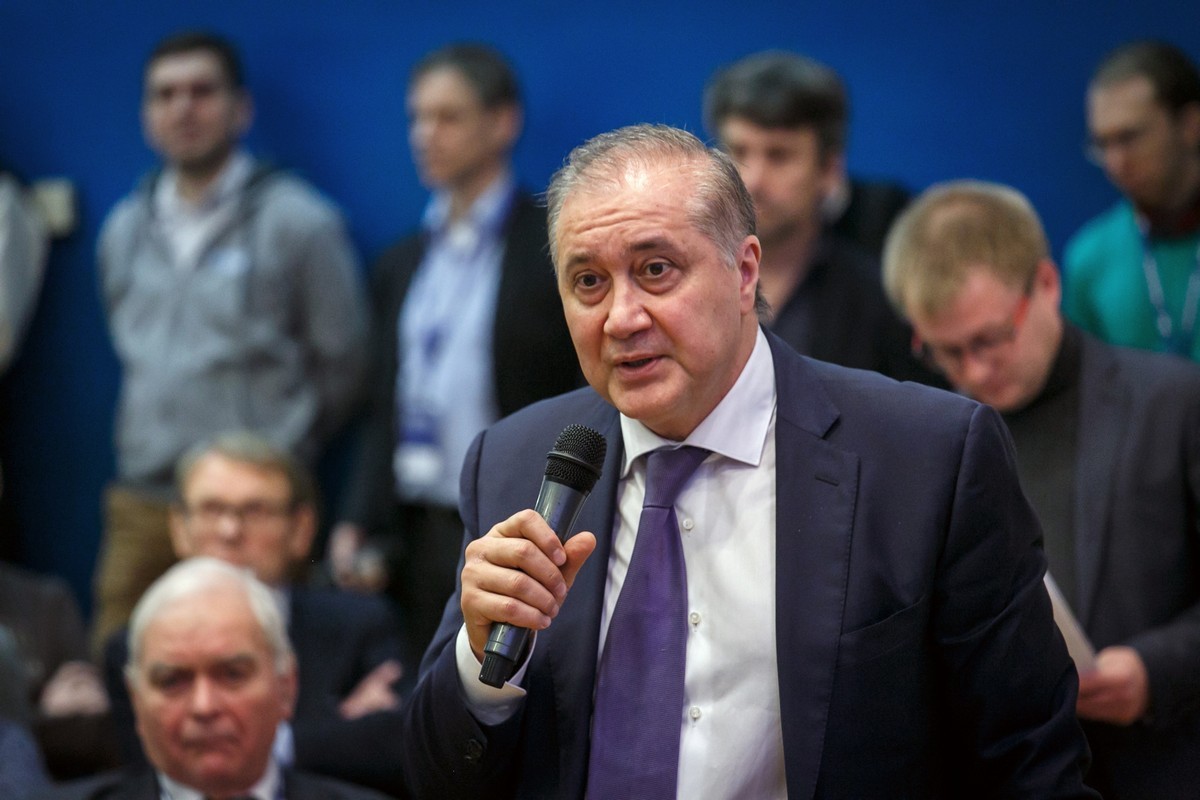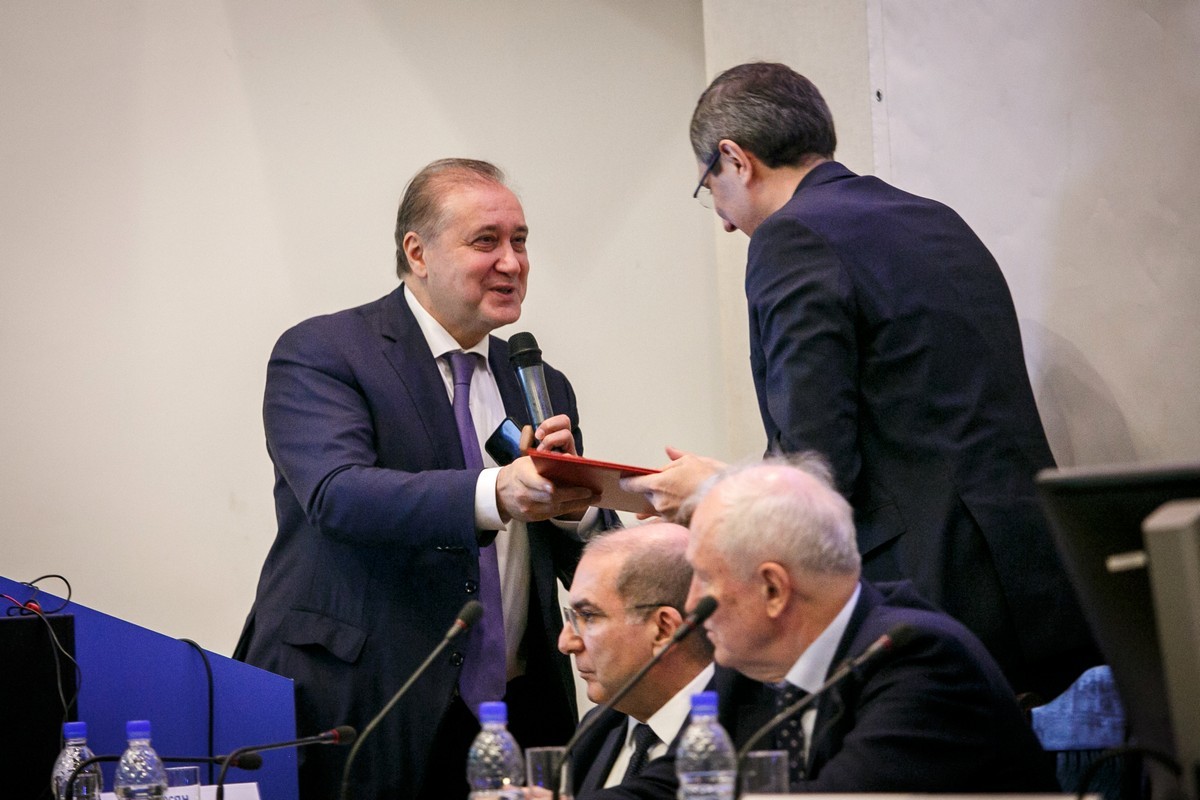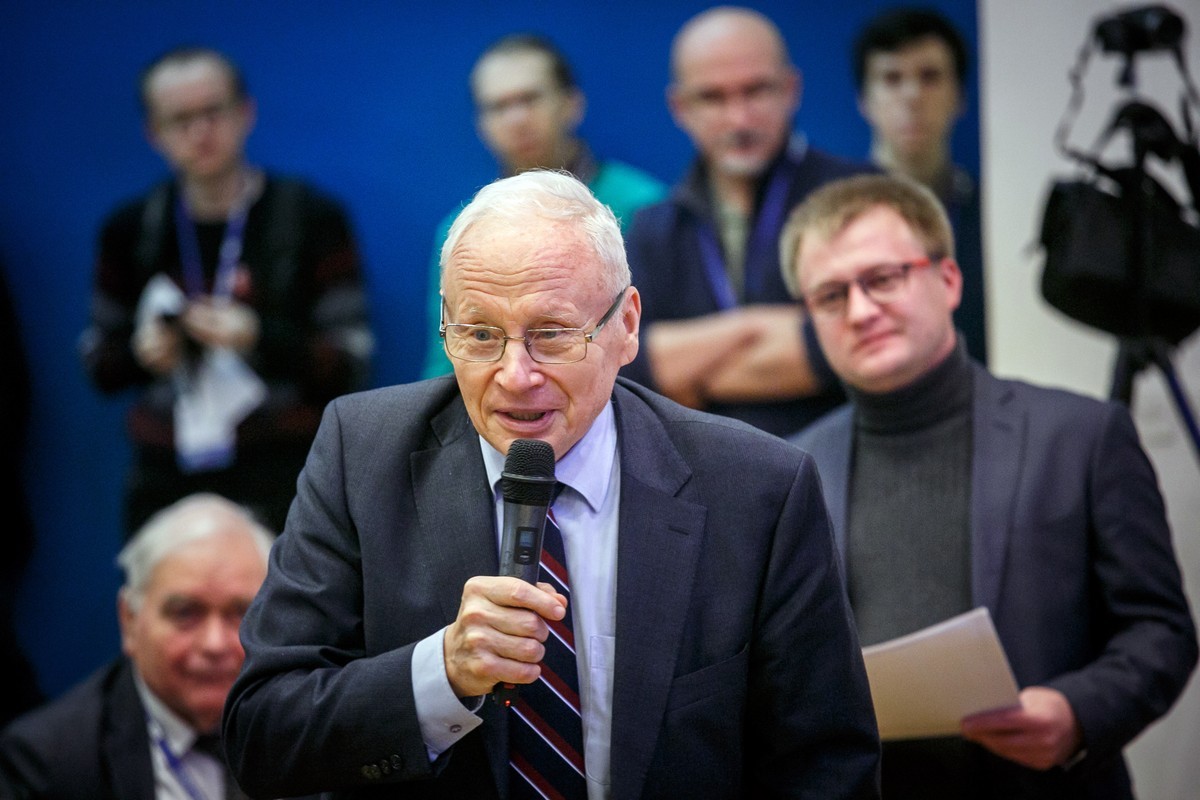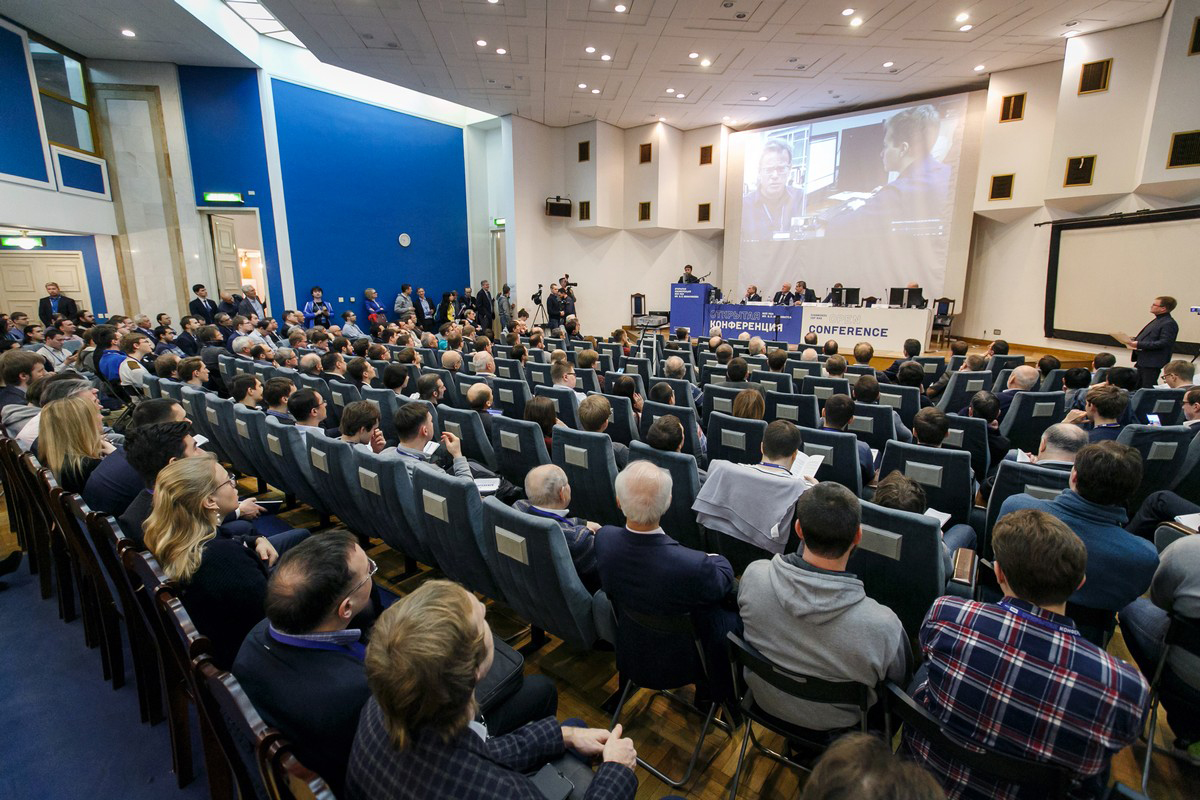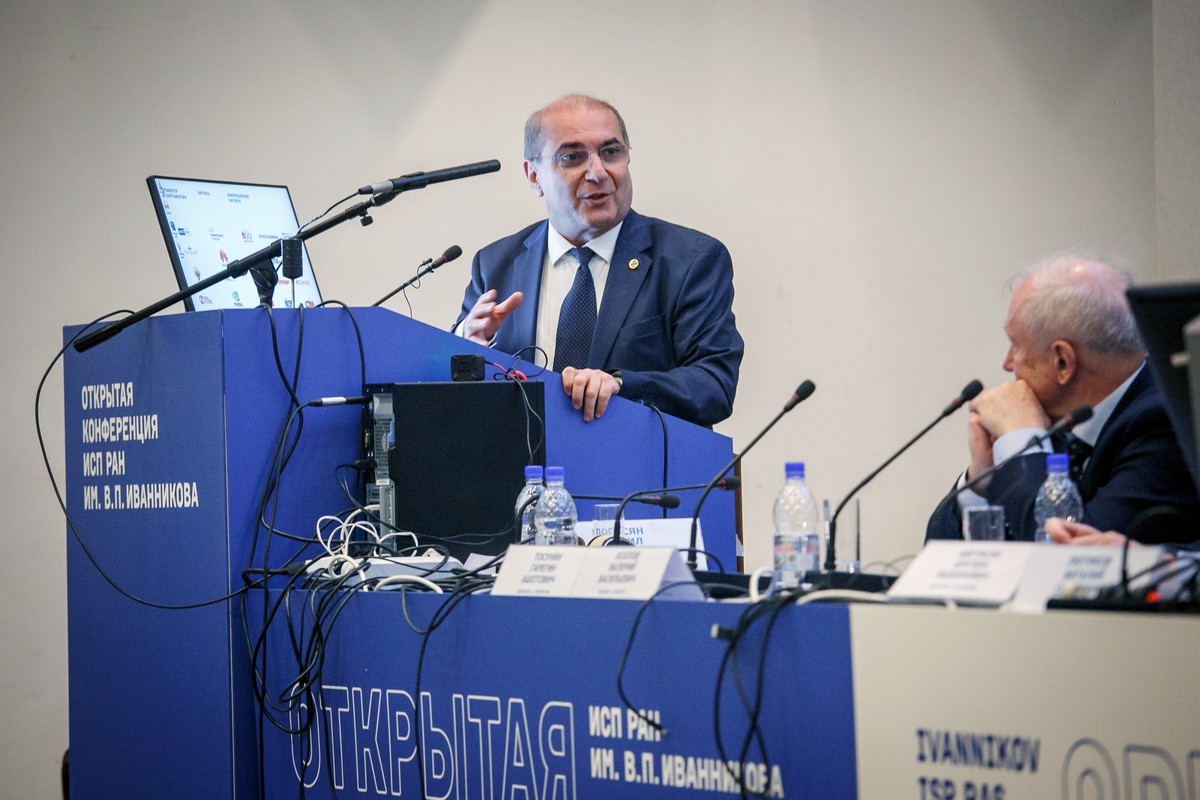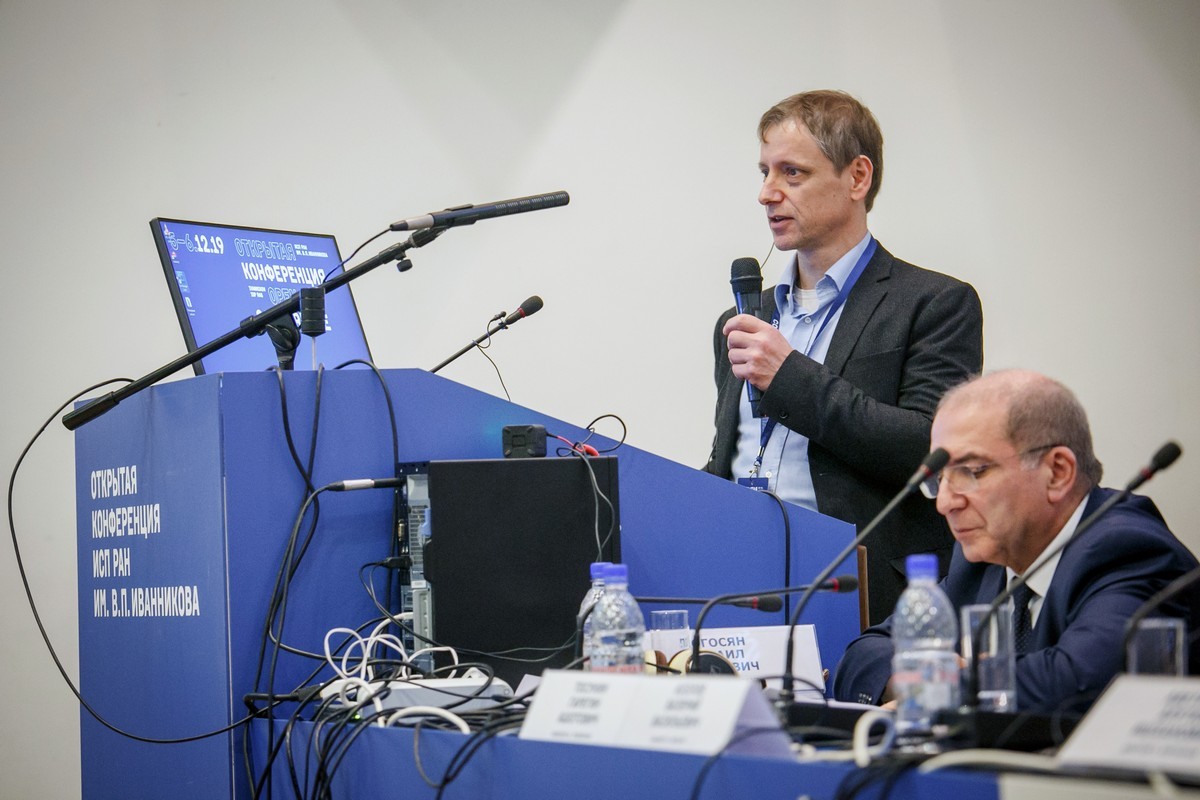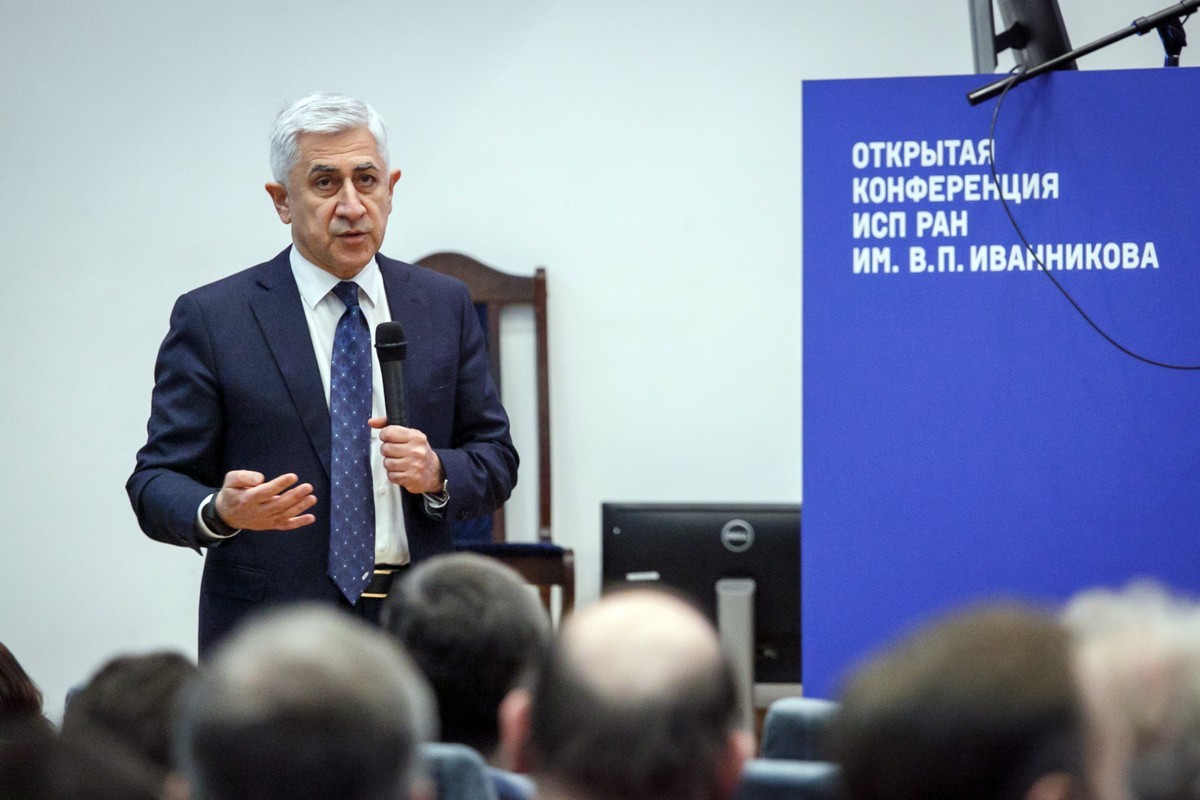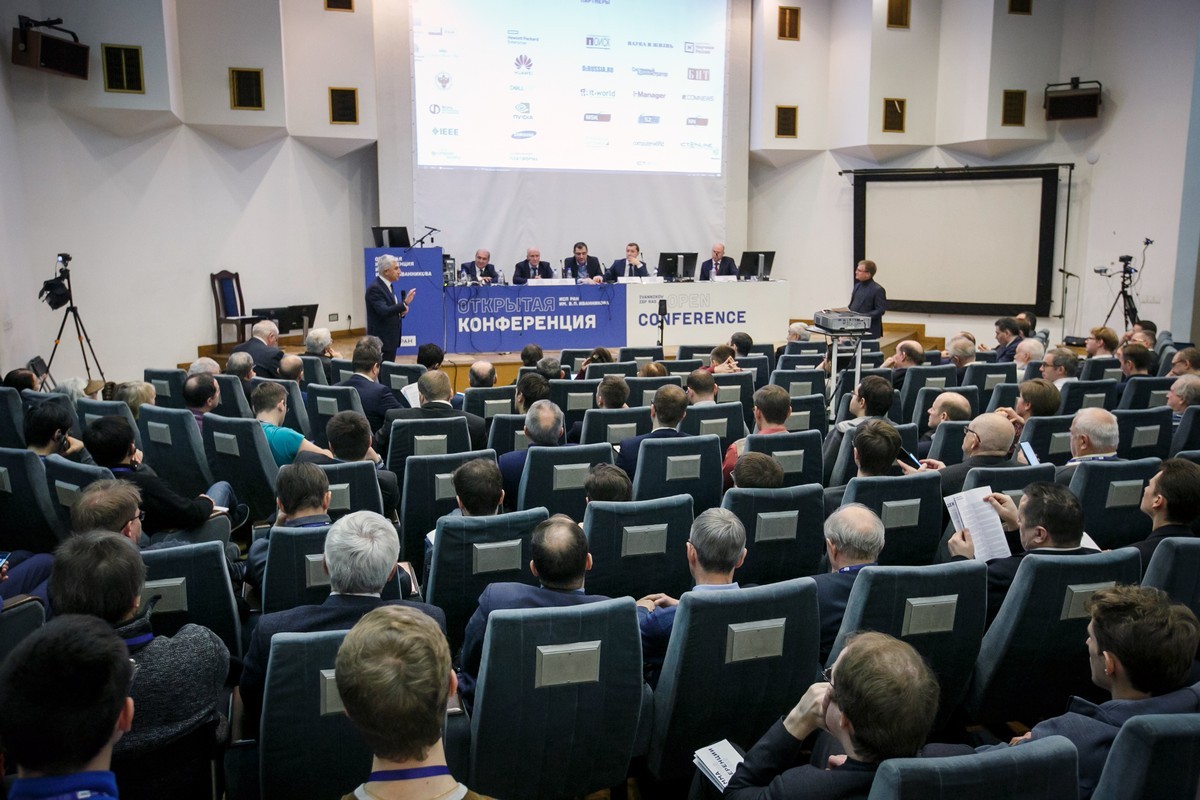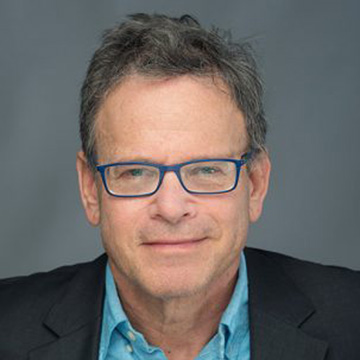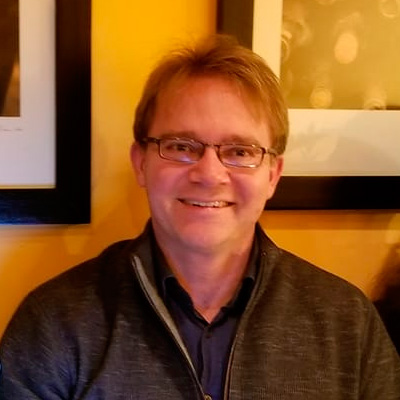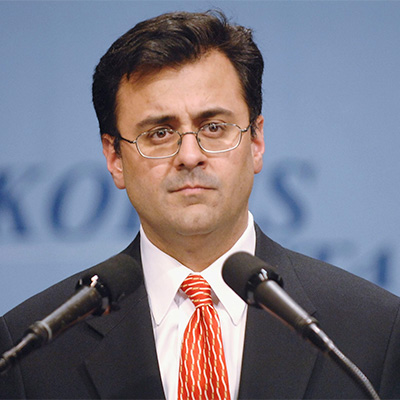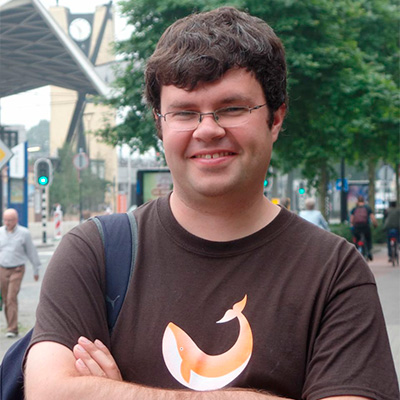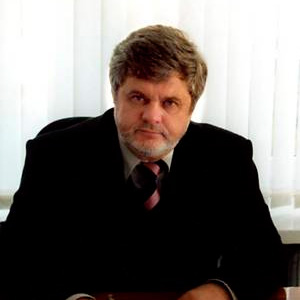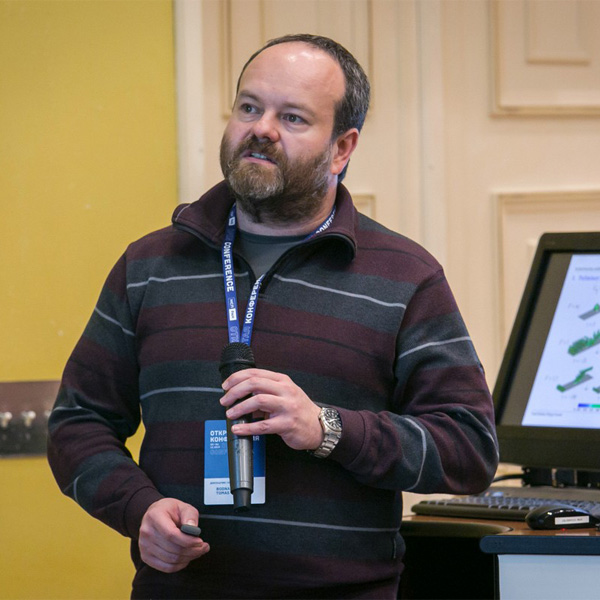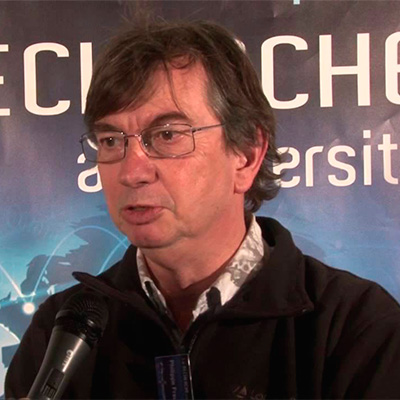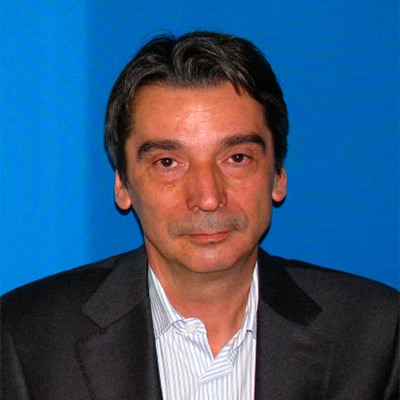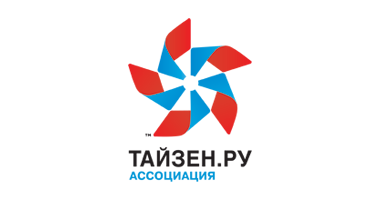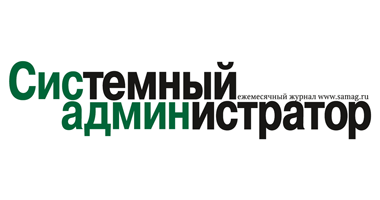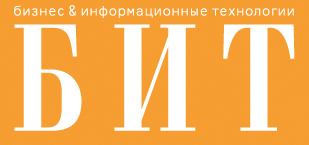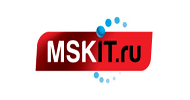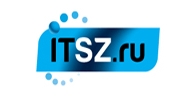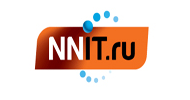Dear colleagues!
We invite you to participate in the Ivannikov ISP RAS Open Conference, which will take place on December 5-6, 2019 in the main building of the Russian Academy of Sciences, Moscow, Russia: Moscow, Leninskiy prospekt, 32A.
The Open Conference is organized with support of:
- IEEE;
- IEEE Computer Society;
- Russian Academy of Sciences (RAS);
- Advanced Research Foundation (ARF);
- Federal Service for Technical and Export Control (FSTEC Russia);
- Commercial partners of ISP RAS (Samsung, Hewlett Packard Enterprise, DELL, NVIDIA and others).
The main sections:
- Program analysis, modeling and transformation technologies.
- Management of Data and Information Systems.
- Open source software for continuum mechanics.
To participate in the Ivannikov ISP RAS Conference please register. To present your research please submit a paper, that wasn't yet published or submitted for other conferences.
We accept original unpublished articles containing the results of research or describing the work in progress. We invite both researchers and practitioners. All accepted papers will be published in the Proceedings of Ivannikov ISP RAS Open Conference, that is indexed in Web of Science and Scopus. The proceedings will be published online in IEEE Xplore digital library.
Submission Guidelines are here.
Paticipation in the conference and publication of articles are free of charge. Travel and accommodation, as well as other expenses are to be paid by the participant.
Deadlines
- Articles submission:
October 2, 2019October 13, 2019 (23:59, GMT+3). - Notification of acceptance: October 25, 2019.
- Camera ready copies: November 18, 2019.
- Participants registration: November 23, 2019.
About the Conference
The Ivannikov ISP RAS Open Conference is an annual event organized by the Institute for system programming of the Russian Academy of Sciences (ISP RAS) to discuss fundamental achievements in computer science and to present its new innovative technologies developed for practical commercial use in various industrial projects.
The main goal is to support the innovation ecosystem, created in ISP RAS for successful development of IT-technologies and their use in education, science and industry.
Every year the Conference unites acknowledged researchers from scientific and educational organizations and representatives of leading IT and other companies.
Program analysis, modeling and transformation technologies
The section is devoted to optimization methods in compiler and code generation, static and dynamic program analysis, etc. The topics include:
- Binary (executable) code reverse engineering.
- Program execution in controlled environment.
- Vulnerability search in executable code.
- Network traffic analysis.
- Compiler optimization and code generation.
- Program static and dynamic analysis.
- Program analysis and testing methods and tools.
Learn More
Management of Data and Information Systems
The section is devoted to data management and data analysis (methods and systems for storing and analyzing large volumes of text, graph, multimedia, scientific and other types of data). The topics include:
- Data mining and information extraction.
- Mathematical theory and methods of machine learning and artificial intelligence.
- Mathematical models of processes and phenomena of the real world.
- Computational linguistics, natural language text analysis and understanding.
- Complex networks analysis, including social, communication, biological networks, etc.
- Signal processing and image analysis.
- User-generated content analysis.
- Information retrieval, recommender systems.
- Ontologies and knowledge bases.
- Information systems and technologies.
- Scalable algorithms for data analysis.
- Data analysis applications.
- Data cleaning, heterogeneous data integration, data deduplication.
- Key technologies for private and hybrid clouds creation.
- High-performance computing and other services in clouds.
- Big data ecosystem.
- Distributed databases and Data/Web Mining technologies.
- Software platforms for internet of things.
- Dynamic load balancing in elastic clouds.
- Planning of task flow in cloud data processing centers.
- Power-saving cloud infrastructures.
Learn More
Open source software for continuum mechanics
The section is devoted to the use of open source software in solving continuum mechanics problems (OpenFOAM, Salome, ParaView, DAKOTA etc.) and comparison of developed software with commercial programs. The topics include:
- Turbulent flows modeling.
- Solving adjoined thermal exchange problems.
- Applied hydrodynamics, gas dynamics and aerodynamics problems.
- Development of personal problem solvers and libraries.
- Scientific visualization and processing of numerical results.
- Education based on open packages issues.
Learn More
Thursday, December 5th 2019
Registration. Coffee (Green Hall - Lobby)
Exhibition of technologies and Lunch (Green Hall - Lobby)
Management of Data and Information Systems (Beige Hall)
Assaf Schuster1
1 Science Department at the Technion, Israel Institute of Technology, Israel
"Challenges in applying Machine Learning for Healthcare"
ПодробнееDownload PDF
Karan Bhatia1, Leonid Kuligin2
1Head of Global Public Policy and Government Relations, New-York, USA, 2 Machine Learning Engineer, Google, Google Cloud
"Accelerating Scientific Advances with Cloud Infrastructures"
Learn moreDownload PDF
Peter Pleshachkov1
1 Core Software Engineer (Distributed Systems) at Hazelcast
"Hazelcast: distributed data structures to scale your app out"
Download PDF
Andrey Demichev1, Alexander Kryukov1, Nikolai Prikhod'ko1
1 SINP MSU
"Metadata driven data management in distributed computing environments with partial or complete lack of trust between user groups"
Download PDF
Anton Teslyuk1, Sergey Bobkov1, Viacheslav Ilyin1, Vasily Velikhov1
1 NRC "Kurchatov Institute"
"Kubernetes container orchestration as a framework for flexible and effective scientific data analysis pipelines"
Download PDF
Valentina Litovchenko1, Evgeniy Ivashko2
1 Petrozavodsk State University, 2 Institute of Applied Mathematical Research, KarRC RAS
"Dynamic forecasting of the completion time of a computational experiment in a Desktop Grid"
Download PDF
Coffee break
Viktor Kuchukov1, Mikhail Babenko1
1 NCFU
"The application of modular arithmetic for matrix calculations"
Download PDF
Andrey Skobtsov1, Anna Kalenkova1
1 HSE
"Efficient Algorithms for Finding Differences Between Process Models"
Download PDF
Open source software for continuum mechanics (Green Hall)
I.B. Petrov1, N.I. Khokhlov2
1 Corresponding member of RAS, Doctor of Science, Head of Chair of Informatics, MIPT, 2 Ph.D., Deputy Director of Applied Geophysics Lab, MIPT
"Application of the method of characteristics for solving the problems of the propagation of dynamic wave disturbances using high-performance computing systems"
Download PDF
Tomáš Bodnár1
1 Czech Technical University in Prague and Institute of Mathematics.
"Far-Field Boundary Conditions for Stably Stratified Flows"
Download PDF
Philippe Fraunié1
1 Professor at Toulon University, research director at Mediterranean Institute of Oceanography (M.I.O) Université Toulon
"Identification of turbulent model parameters in ocean surface models"
Download PDF
Vladimir Sudakov1, Vladimir Osipov1, Yury Nechaev1, Alexander Vasilyev1
1 Keldysh Institute of Applied Mathematics, RAS
"The study of neurodynamic systems of continuous adaptive control"
Download PDF
Mikhail Zaitsev1
1 IBRAE RAS
"Numerical studies of unsteady motion of continuous flows"
Download PDF
Natalia Tuchkova1, Konstantin Belyaev1, Gury Mickailov1
1 FITS IU RAS, 2 Institute of Oceanology P.P. Shirshova
"Numerical Experiments with the coupled ocean-earth-atmosphere circulation model and analysis of decadal variability of its main physical characteristics"
Download PDF
Coffee break
Konstantin Belyaev1, Andrey Kuleshov2, Ilya Smirnov3
1 Institute of Oceanology P.P. Shirshova, 2 Keldysh Institute of Applied Mathematics, RAS, 3 MSU, Faculty of Computational Mathematics and Cybernetics
"Data assimilation method for the ocean circulation model NEMO and its application for the calculation of ocean characteristics in the Arctic Zone of Russia"
Download PDF
Konstantin Koshelev1, Sergei Strijhak1
1 ISP RAS
"Simulation of particle dynamics in planetary boundary layer and in a model wind farm"
Download PDF
Aleksandr Ivanov1, Sergei Strijhak2
1 Keldysh Institute of Applied Mathematics, RAS, 2 ISP RAS
"Modeling weather conditions in the port area and in the coastal zone of Tiksi Bay"
Download PDF
Program analysis, modeling and transformation technologies (Blue Hall)
Nikolaj Bjørner1
1 Principal Researcher at Microsoft Research, Redmond, USA
"From North Stars to Clever Insights - On using grand challenges to drive new techniques in automated theorem proving"
Learn moreYouil Kim1
1 Samsung Research
"Using Svace static analysis tool in Samsung environments"
Aleksei Nedoria1
1 Languages and Frameworks Head, Huawei Russian Research Institute, St. Petersburg
"Language Design: OOP or not OOP or better OOP"
Pavel Kosov1, Sergey Yakushkin2
1 Head Engineer, Huawei R&D Center, 2 TechLead, Huawei R&D Center
"Profile guided optimizations for mobile devices in LLVM"
Download PDF
Coffee break
Nikita Malyshev1, Irina Dudina1, Daniil Kutz1, Alexander Novikov1, Sergey Vartanov1
1 ISP RAS
"SMT Solvers in Application to Static and Dynamic Symbolic Execution: a Case Study"
Download PDF
Yauhen Klimiankou1
1 Belarusian State University of Informatics and Radioelectronics
"Constexpr: a Great Good but Wrong Idea"
Gleb Morgachev1, Valery Ignatyev1, Andrey Belevantsev1
1 ISP RAS
"Detection of Variable Misuse Using Static Analysis Combined with Machine Learning"
Download PDF
December 5th 2019, 11:30-13:30, Exhibition of technologies (Green Hall - Lobby)
Anxiety is a framework for finding errors and potential vulnerabilities during software development, QA, and deployment phases. It is based on dynamic symbolic execution, which allows generating input data for the issues found without source code or debugging information present in the binary. Anxiety can be used for adhering to the GOST R 56939-2016 requirements.
AstraVer Toolset is a deductive verification system for key software components. It allows developing and verifying security policy models as well as proving the correctness of software modules written in the C programming language. AstraVer is essential for ensuring the required trust levels from ADV_SPM and ADV_FSP assurance families as defined in the ISO 15408 standard.
BINSIDE is a static program analysis tool for finding defects in binary code. It is useful when checking programs without source code, such as closed source 3rd party libraries, as well as assisting with required static information to dynamic analysis tools.
Constructivity 4D is a technology for creating innovative software services that is capable of processing highly dynamic scenes and vast arrays of spatial and temporal data. It performs visual analysis of millions of objects with individual geometry and dynamic behavior. Constructivity is deployed within the Synchro system that is used for 4D modeling of extremely large construction sites.
DIGITEF is a software system based on OpenFOAM and other open source tools, as well as unique libraries developed at ISP RAS. DigiTEF solves various application problems of gas dynamics, aerodynamics, hydrodynamics, and acoustics. It is tailored for creating and working with highly sophisticated digital models of industrial devices. DigiTEF is included in the Unified Register of Russian Programs (№ 5377).
TRAWL is a unique production level tool for analyzing various binary code features that supports multiple target processor architectures. It does not require debug information or source code. Trawl can be used to analyze all kinds of software ranging from boot loaders to OS kernels and user level applications. It is included in the Unified Register of Russian Programs (№ 5323).
ISP FUZZER is a tool for performing dynamic program analysis based on the fuzzing approach. It can detect errors, backdoors, and vulnerabilities either with or without access to the program’s source code. ISP Fuzzer allows organizing a development process that adheres to the GOST R 56939-2016 requirements.
Klever is a framework for checking models extracted from the source code of large software systems developed in the C programming language. Klever provides means for automatic checking of a variety of security, robustness, and performance requirements.
Lingvodoc is a system intended for collaborative multi-user documentation of endangered languages, creating multi-layered dictionaries and performing scientific work with the received sound and text data. It is a result of a joint project with the Institute of Linguistics of the Russian Academy of Sciences and Tomsk State University. Lingvodoc is under active development since 2012 and can be found on lingvodoc.ispras.ru.
MASIW is a toolset for developing highly reliable hardware and software systems for avionics, medicine, and other safety critical areas. It is designed for engineers creating airborne hardware– software systems that are developed using the integrated modular avionics (IMA) approach. MASIW can be easily adapted for other application areas.
MicroTESK is an industry-targeted framework for generating test programs in the assembly language for functional verification of microprocessors. It includes the modeling framework (building microprocessors models based on formal specifications) and the generation framework (building test programs based on test templates).
Protosphere is a system of deep packet inspection (DPI). It is the part of intrusion and information leak protection systems. Protosphere detects inconsistencies between a protocol specification and a specific implementation. It allows to add support quickly for new protocols (either open or closed) due to the flexibility of its internal representation.
Retrascope is a functional verification toolkit for digital hardware designs. Retrascope provides automated engines for code analysis, formal model extraction and functional test generation. The toolkit accepts as inputs digital hardware module descriptions, written on the synthesizable subset of Verilog and VHDL languages, as well as their behavioral specifications.
SciNoon is a system for collaborative exploration of scientific papers. This software is essential for a group of researchers to dive quickly into the new area of knowledge and to find answers on their questions, following up with tracking new research on the topic of interest with highly customizable alerts.
SVACE is an essential tool of the secure software development life cycle, the main static analyzer that is used in Samsung Corp. It detects more than 50 critical error types as well as hundreds of coding issues. Svace supports C, C++, C#, and Java. Support for Kotlin and Go programming languages is in progress and is planned for Q4 of 2020. Svace is included in the Unified Register of Russian Programs (№ 4047).
Texterra is a scalable platform for extracting semantics from text. It contains the complete set of technologies for creating multifunctional applications for text analysis. Texterra bases its semantic analysis approach in the concept identification. It is included in the Unified Register of Russian Programs (№ 4048).
ISP Obfuscator is a set of technologies to prevent mass exploitation of vulnerabilities resulting from errors or backdoors. When a hacker is capable of attacking one of the devices that has a certain software installed, the rest will remain protected by changes made by the tool to the software code.
The software and performing complex, resource-intensive calculations using both containers and virtual machines. They are designed especially for the deployment of cloud environments.
Talisman is a framework for data analysis that is designed for retrieving people, community, and company data. It utilizes modern approaches for machine learning, computer linguistics, complex network analysis and big data processing. Talisman is capable of finding relations and their patterns by analyzing large graphs consisting of hundreds of millions of nodes.
ISP RAS Foundation Platform for creating program analysis systems is built on top of open source QEMU emulator. The software is essential for organizing multi and cross platform development. It also supports reverse debugging and introspection features, as well as the full system emulation mode for debugging low-level software.
Method for automatic recognition and classification of 12-lead ECG.
Early prediction of retinal organoid differentiation using neural networks.
Friday, December 6th 2019
Registration. Coffee (Green Hall - Lobby)
Poster Session: "System programming and CFD problems" (Green Hall - Lobby)
Workshop: Gathering and processing LHC metadata (Beige Hall)
Alexei Klimentov1, Sergey Kuleshov2
1 Brookhaven National Laboratory, Upton, USA, 2 Professor, Universidad Andrés Bello, Santiago, Chile
"LHC Data Processing and Data Management Systems at Exabyte Scale"
Tatiana Korchuganova1
1 UNAB, ISP RAS
"Monitoring of Distributed Data Production and Analysis for High Energy Physics Experiments"
Alexandr Alekseev1
1 UNAB, ISP RAS
"Analytical Platform for Distributed Data Production and Analysis in ATLAS Experiment at LHC"
Coffee break, poster session
Management of Data and Information Systems (Beige Hall)
Denis Aivazov1, Mikhail Drobyshevskiy1, Denis Turdakov1, Alexander Yatskov1, Maksim Varlamov1, Danil Shayhelislamov1
1 ISP RAS
"Collecting Influencers: a Comparative Study of Online Network Crawlers"
Aram Avetisyan1, Mikhail Drobyshevskiy1, Denis Turdakov1
1 ISP RAS
"Predicting the Popularity of News Stories in the Early Stages of Dissemination"
Anastasiia Ryzhova1, Ilya Sochenkov1
1 Skolkovo Institute of Science and Technology
"Deep learning for customs classification of goods based on their textual descriptions analysis"
Aleksandr Lazarenko1, Sergey Avdoshin1, Natalia Chichileva2, Pavel Naumov3
1 HSE, 2 Department of Product Innovation and Development of IB Group LLC, 3 BMSTU
"Use cases of AI usage in cybersecurity"
Lunch
Sergey Vychegzhanin1, Evgeny Kotelnikov1
1 Vyatka State University
"Comparison of Named Entity Recognition Tools Applied to News Articles"
Denis Zubarev1, Ilya Sochenkov1
1 Federal Research Center "Computer Science and Control" of RAS
"Cross-language document retrieval methods"
Ansis Ataols Berzins1
1 University of Latvia
"Using i-vectors for automated detection of language similarity"
Mikhail Drobyshevskiy1
1 ISP RAS
"Methods and tools for modeling and generating complex networks with specific graph properties"
Olga Ataeva1
1 Dorodnicyn Computing Centre, RAS
"Developing a semantic digital library serving as a basis for scientific knowledge space construction"
Coffee break
Open source software in continuum mechanics problems solving (Green Hall)
Bernhard Peters1
1 Prof. Dr.-Ing., The University of Luxembourg
"Numerical Approaches to Particle-laden Multi-phase Flows for Industrial Applications"
Sébastien Gadal1
1 Professor, Aix-Marseille University
"The key-issues of the Geographic Knowledge in Remote Sensing Image Processing Artificial Intelligence"
Download PDF
Coffee break, poster session
Timofey Mukha1
1 Chalmers University of Technology, Gothenburg, Sweden
"The effect of numerical dissipation on the predictive accuracy of wall-modelled large-eddy simulation"
Download PDF
Ekaterina Kalaushina1, Alexander Smirnovsky1, Dmitriy Brovin2, Elizaveta Kolesnik1
1 SPbPU, 2 STR Group, Inc.
"Large Eddy Simulation of turbulent circular jet using OpenFOAM"
Download PDF
Matvey Kraposhin1
1 ISP RAS
"Open Source Software as a construction set for complex digital models of technical systems"
Download PDF
Daniil Ryazanov1, Matvey Kraposhin1, Victoria Korchagova1, Sergei Strijhak1, Kirill Vatutin1, Valeriia Melnikova1, Artem Konovalchik1, Oleg Plaksenko1, Maxim Konopelkin1, Maxim Kudrov1, Ivan Martynov1
1 ISP RAS
"Automation tool for aerodynamics and strength numerical analysis of radar structures based on open source programs"
Download PDF
Lunch
Artem Nuriev1, Olga Zaitseva1, Olga Zakharova1
1 Kazan Federal University
"A numerical study of vibration-driven mechanism of propulsion in viscous fluid"
Download PDF
Andrey Epikhin1, Daniil Ryazanov1, Victoria Korchagova1, Maxim Shatskiy1, Matvey Kraposhin1
1 ISP RAS
"The usage of open source software for solving computational aeroacoustics problems"
Victoria Korchagova1, Sofia Sautkina 2, Ivan Fufaev3
1 ISP RAS, 2 Bauman Moscow State Technical University, 3 Keldysh Institute of Applied Mathematics, RAS
"Review of open source software for modeling gas flows by the Galerkin discontinuous method"
Download PDF
Ryatina Evgeniya1, Kseniia Kuzmina1, Ilia Marchevsky1
1 ISP RAS
"The Nvidia CUDA technology capabilities usage in the simulation of two-dimensional flows by vortex methods"
Download PDF
Coffee break
Tufan Arslan1, Murat Ozbulut2
1 Norwegian University of Science and Technology, Trondheim, Norway
"GPU Simulation of Sloshing in a Vibrating Water Tank with Smooth Particle Hydrodynamics (SPH) Method"
Alexey Gurin1, Alexey Baykin2
1 Institute of Hydrodynamics M.A. Lavrentieva SB RAS
"FEMEngine: finite element method C++ code based on functional and template metaprogramming"
Download PDF
Andrei Popov1, Victoria Bondarchuk1, Nikolai Tverdokhleb1
1 Bauman Moscow State Technical University
"Coupled thermohydraulic problems simulation by particle finite element method PFEM-2 by means of free software"
Download PDF
Evgeny Mikhailov1, Ilias Sibgatullin2
1 MSU, 2 ISP RAS
"Research of influence of regular magnetic fields on flows in outer rings of galaxies"
Download PDF
A tutorial: Programming Constraint Services with Z3 (Blue hall)
Nikolaj Bjørner1
1 Principal Researcher at Microsoft Research, Redmond, USA
Many program verification, analysis, testing and synthesis queries reduce to solving satisfiability of logical formulas. Yet, there are many applications where satisfiability, and optionally a model or a proof, is insufficient. Examples of useful additional information include interpolants, models that satisfy optimality criteria, generating strategies for solving quantified formulas, enumerating and counting solutions. The tutorial describes, in an interactive way using jupyter notebooks, logical services from the point of view of the Satisfiability Modulo Theories solver Z3.
Coffee break, poster session
E.M. Lavrishcheva1
1 Professor, ISP RAS
"System modeling for applied knowledge. Research directions for system programming"
Download PDF
Iliya Trub1
1 Samsung Research Russia
"High Performance Flexible Memory Allocators in Complex Projects"
Download PDF
Aleksandr Samonov1
1 Alexander Mozhaysky Military Space Academy
"Developing automated information system based on an ontology for program systems quality assessment"
Download PDF
Lunch
Lev Gorelikov1
1 Ntts Modul'
"Functional modeling for embedded software QA in real-time systems"
Download PDF
Movsisyan Hovhannes1, Jivan Hakobyan1, Sevak Sargsyan1
1 Yerevan State University
"Improving fuzzing performance by applying interval mutations"
Download PDF
Alexander Popov1
1 Positive Technologies
"Linux Kernel Fuzzing in Practice"
Liang Guangtai1
1 Huawei
"CodeBot: A Smart Weapon to Rescue Developers from Annoying Coding Processes"
Download PDF
Coffee break
N.O. Besshaposhnikov1
1 FGU Federal Research Center of NIISI RAS
"PictoWorld: An educational free of text programming system and its deployment experience"
Download PDF
11:20-13:20, Open source software in continuum mechanics problems solving (Green Hall - Lobby)
Maxim Khomenko1
1 ILIT RAS — Branch of FSRC "Crystallography and Photonics" RAS
Computation efficiency of S-CLSVOF method for additive manufacturing applications.
Tatiana Stenina1, Tatiana Elizarova2, Daniil Ryazanov3, Eugene Ryabinkin4
1 Lomonosov Moscow State University, 2 Keldysh Institute of Applied Mathematics of the RAS, 3 ISP RAS, 4 NRC "Kurchatov Institute"
Implementation of regularized equations for the disk pump simulation problem in OpenFOAM.
Artem Nuriev1, Airat Kamalutdinov1
1 Kazan Federal University
Study of hydrodynamics near oscillating beams in OpenFOAM package.
Daniil Ryazanov1, Ilias Sibgatullin1
1 ISP RAS
Regularized Equations for Biharmonic Attractors of Internal Gravity Waves.
Artem Kuvshinnikov1, Alexander Bondarev1
1 Keldysh Institute of Applied Mathematics, RAS
Parametric study of the accuracy of OpenFOAM solvers for the oblique shock wave problem.
Elena Malinovskaya1
1 Institute of Atmospheric Physics A.M. Obukhov RAS
Study of the conditions for the occurrence of aeolian microrelief.
Maria Komarova1
1 Bauman Moscow State Technical University
Verification of SolidDisplacementFoam calculation core of OpenFOAM software.
Daria Romanova1, Sergei Strijhak1, Konstantin Koshelev1, Matvey Kraposhin1
1 ISP RAS
Modeling the reservoir flooding problem using the extended version of the porousMultiphaseFoam library.
Mikhail Chmykhov1, Victor Kozlov1
1 NRNU MEPhI
On numerical modeling of natural convection based on the OpenFOAM solver.
Daria Romanova1
1 ISP RAS
The study of the capture of material by the flow on a slope using OpenFOAM.
Mikhail Levin1
1 ISP RAS
Data selection from Big Data to design of substantial mathematical models.
Programme Committee
Steering committee
- Arutyun Avetisyan, Prof., Academician of RAS, director of the ISP RAS.
- Garbuk S.V., Ph.D. in Technical Sciences, scientific projects director (Higher School of Economics).
- Gergel V.P., Doctor of Technical Sciences, Professor at the Institute of Information Technology, Mathematics and Mechanics, NNSU.
- Kalyaev I.A., Doctor of Technical Sciences, RAS academician, scientific supervisor (Research Institute of multiprocessor computing systems, SFU).
- Lyutikov V.S., deputy director of FSTEC Russia.
- Fedosov E.A., Doctor of Technical Sciences, RAS academician, scientific supervisor of GosNIIAS.
- Assaf Schuster, Professor, head of AI center (Computer Science Department, Israel Institute of Technology (Technion)).
- David Alan Grier, Associate professor at the George Washington University, 2013 IEEE Computer Society President.
- Costas Stasopoulos, 2015-2016 IEEE Region 8 Director (Europe, Africa and Middle East), Assistant manager at Electricity Authority of Cyprus.
- Hironori Kasahara, Professor of Computer Science at Waseda University in Tokyo, 2018 IEEE Computer Society President.
Organizing Committee
- Arutyun Avetisyan, Prof., Academician of RAS, director of the ISP RAS.
- Belousov Igor, Prof., SAP .
- Volkov Dmitry, editor-in-chief ("Open Systems"), senior research fellow (Keldysh Institute of Applied Mathematics).
- Ivanov Sergey, Hewlett Packard Enterprise, Russia.
- Konyagin Dmitriy, NVIDIA.
- Luchinin Nikolay, Dell, Russia.
- Pakulin Nikolay, Ph.D., ISP RAS.
- Prokhorov Sergei, Prof., MIPT.
- Samovarov Oleg, Ph.D., ISP RAS.
Programme Committee
Program analysis, modeling and transformation technologies
- Arutyun Avetisyan, Prof., Academician of RAS, director of the ISP RAS.
- Belevantsev Andrey, Dr. Sci., ISP RAS.
- Volkonsky V.Yu., Ph.D., JSC "MCST".
- Gaysaryan Sergey, Ph.D., ISP RAS.
- Devyztin P.N., Prof., ISEDU .
- Drozdov Alexander, Prof., MIPT.
- Kanatov Alexey, Ph.D., Samsung.
- Koverninsky I.V., FGUP GosNIIAS.
- Kuznetsov S.D., Prof., ISP RAS.
- Makarov Vladimir , Ph.D., NovSU.
- Ostanevich Sergey, Intel.
- Petrenko Aleksander, Prof., ISP RAS.
- Proskurin Vadim, Ph.D., EMA IS.
Management of Data and Information Systems
- Denis Turdakov, Ph.D., ISP RAS.
- Natalia Loukachevitch, Dr. Sci., Research Computing Center of Moscow State University.
- Dmitry Ustalov, Ph.D., University of Mannheim.
- Kuznetsov Sergey, Dr. Sci., Professor, ISP RAS.
- Anton Korshunov, Ph.D., Quantum.uk.
- Nikita Astrakhantsev, Ph.D., Microsoft Corp.
- Dmitry Lizorkin, Ph.D., Google LLC.
- Boris Dobrov, Ph.D., Research Computing Center of Moscow State University.
- Elena Tutubalina, Ph.D., Kazan Federal University.
- Andrei Tchernykh, Dr. Sci., Prof., CICESE Research Centre (Ensenada, Baja California, Mexico).
- Oleg Samovarov, Ph.D., ISP RAS.
- Andrey Filchenkov, Ph.D., ITMO University.
- Nikolai Kuzjurin, Dr. Sci., Prof., ISP RAS.
- Vasily Velikhov, Ph.D., NRC "Kurchatov Institute".
- Sochenkov, Ph.D., Federal Research Center of Computer Science and Management (RAS).
Open source software for continuum mechanics
- Prof J.M. Redondo, Universitat Politècnica de Catalunya, PELNoT, LAB-ERCOFTAC.
- Kornev N.V., Prof. Dr-Ing. habil., Universitat Rostock.
- Dr. Henrik Rusche, WIKKI Gesellschaft fur numerische Kontinuumsmechanik mbH.
- Chashechkin Yu D., Prof., Ishlinsky Institute for Problems in Mechanics RAS.
- Yakobovsky M.V., RAS corresponding member, Prof., Keldysh Institute of Applied Mathematics.
- Yelizarova T.G., Dr.Sci., Prof., Keldysh Institute of Applied Mathematics.
- Scheglov G.A., Prof., Bauman MSTU.
- Strizhak S.V., Ph.D., ISP RAS.
- Sigbatullin I.N., Ph.D., Department of Mechanics and Mathematics, Lomonosov Moscow State University.
- Marchevskiy I.K., Ph.D., Bauman MSTU.
- Kraposhin M.V., ISP RAS.
- Terekhov K.M., Ph.D., INM RAS.
- Artem Nuriev, PhD, N.I. Lobachevsky Institute of Mathematics and Mechanics.
- Tellez Alvarez, Jackson, PhD., Flumen Institute, Universitat Politècnica de Catalunya – Consorci Besòs Tordera.
Registration
Paticipation in the conference and publication of articles are free of charge. Travel and accommodation, as well as other expenses are to be paid by the participant.
Contact us via e-mail scsec@ispras.ru to get instructions.
Submission
The papers should be 3-7 pages long, formatted using Templates for Conference Proceedings. Peer review is double-blind. Please remove any references to authors (such as names, affiliations or e-mails) from submitted articles, as well as direct references to previous works. In case of successful review and acceptance you will be requested to submit camera-ready text with necessary author details.
Submission is open at EasyChair.
Submissions that violate these guidelines will be rejected.
Venue Information
Where to find us
Location
The conference takes place at the Main building of the Russian Academy of Science. See the map for exact information.
Transport
The RAS Main building is situated not far from Moscow Metro station "Leninskiy prospect" and Moscow Central Circle station "Ploshchad Gagarina".
Details
The conference is held from 9:00 to 18:00 (with coffee breaks and lunch for guests and participants).
